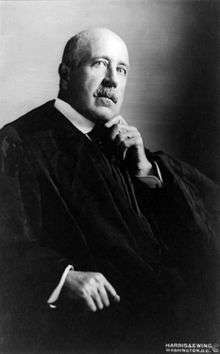Robert Wodrow Archbald
| Robert Archbald | |
|---|---|
 | |
| Judge of the United States Court of Appeals for the Third Circuit | |
|
In office January 31, 1911 – January 13, 1913 | |
| Appointed by | William Taft |
| Preceded by | Seat established |
| Succeeded by | Seat abolished |
| Judge of the United States Commerce Court | |
|
In office January 31, 1911 – January 13, 1913 | |
| Appointed by | William Taft |
| Preceded by | Seat established |
| Succeeded by | Seat abolished |
| Judge of the United States District Court for the Middle District of Pennsylvania | |
|
In office March 29, 1901 – January 31, 1911 | |
| Appointed by | William McKinley |
| Preceded by | Seat established |
| Succeeded by | Charles Witmer |
| Personal details | |
| Born |
September 10, 1848 Carbondale, Pennsylvania, U.S. |
| Died |
August 19, 1926 (aged 77) Martha's Vineyard, Massachusetts, U.S. |
| Alma mater | Yale University |
Robert Wodrow Archbald (10 September 1848 – 19 August 1926) was a United States federal court judge from Pennsylvania. He was the ninth federal official on whom Articles of Impeachment were served, and only the third to be convicted and removed from office.
Early life and career
Born in Carbondale, Pennsylvania of James Archbald and Sarah Augusta Frothingham Archbald (born 1805), Archbald attended Yale University, graduating with an A.B. in 1871. He read law in 1873, and was admitted to the bar, entering private practice until 1884. That year, Archbald was appointed as a Judge on the Lackawanna County (45th Judicial District) Court of Common Pleas. In 1888, Judge Archbald became President Judge of the Court of Common Pleas for Lackawanna County in 1888.
Federal judge
On March 29, 1901, Archbald received a recess appointment from President William McKinley to the United States District Court for the Middle District of Pennsylvania, to a new seat created by 31 Stat. 880. He was formally nominated on December 5, 1901, and confirmed by the United States Senate, and received his commission, on December 17, 1901.
On December 12, 1910, President William Howard Taft nominated Judge Archbald to the United States Commerce Court, created by 36 Stat. 539. He was confirmed by the Senate on January 31, 1911, and received his commission the same day. In addition to his duties on the Commerce Court, Archbald was also assigned to the United States Court of Appeals for the Third Circuit by Chief Justice Edward Douglass White upon his commission to help reduce workload.
Impeachment
After Wrisley Brown investigated charges that Judge Archbold bought coal lands at cheap prices for his personal benefit from railroads and real estate interests involved in litigation before his federal court, and also took a European trip in 1910 paid for by those frequent litigants, the House Judiciary Committee recommended to the United States House of Representatives that he be impeached. The railroads alleged to be shaken down included the Erie Railroad, Lehigh Railroad and the Reading Railroad.[1]
The United States House of Representatives voted to send 13 Articles of impeachment against Archbald to the U.S. Senate, by a vote of 223 to 1 on July 13, 1912. Only Scranton's U.S. Congressman, John R. Farr, who sat on that committee, voted in Archbald's favor. Articles I, II, III and VI alleged that Archbald had entered into agreements with litigants at a substantial benefit to himself. Article IV alleged a wrongful communication with litigants. Articles V, VII, VIII, IX and X alleged that he had improperly solicited and accepted gifts from litigants. Article XI alleged he had improperly solicited and accepted gifts from attorneys. Article XII alleged he allowed corrupt practices during jury selection. Article XIII alleged a general charge of bringing the Judiciary into disrepute. The offences alleged in Articles I through XI were connected with holidays in Europe and other gifts received from coal mine workers and railroad officials.
On 16 July, the Senate began Archbald's trial. Judge Archbald took the witness stand in his own defense on January 6, 1913, claiming that the gifts and favorable deals were the result of longstanding friendships. His wife also testified for the defense. The Senate convicted him of five of the 13 articles on 13 January 1913. The Senate then voted to disqualify him from further office by a vote of 39 to 35. Pennsylvania's two Republican Senators, Boies Penrose of Philadelphia, and George T. Oliver of Pittsburgh, voted against impeachment and lifetime disqualification, but the majority of other senators disagreed.
The exact voting division on each Article is as follows:
|
|
|
|
Archbald was convicted on Articles I, III, IV, V and XIII and was accordingly removed from office. (Article II gained a majority of votes, but not the two-thirds necessary under the U.S. Constitution to convict).
Despite the outcome, Archbald continued to declare his innocence. "I have always known that I have done no wrong and the vote of no one makes it otherwise," he said before leaving for Scranton with his family. "Judge Archbald came as near being an ideal common pleas judge as one can hope to find," one judicial colleague said upon his death. Lawyers eulogized him as a "discriminating practitioner" whose influence "made a deeper impression than any other judge in the history" of Lackawanna County.[2]
References
Sources
- Robert Wodrow Archbald at the Biographical Directory of Federal Judges, a public domain publication of the Federal Judicial Center.
- GPO History of Impeachment
| Legal offices | ||
|---|---|---|
| New seat | Judge of the United States District Court for the Middle District of Pennsylvania 1901–1911 |
Succeeded by Charles Witmer |
| Judge of the United States Commerce Court 1911–1913 |
Seat abolished | |
| Judge of the United States Court of Appeals for the Third Circuit 1911–1913 | ||